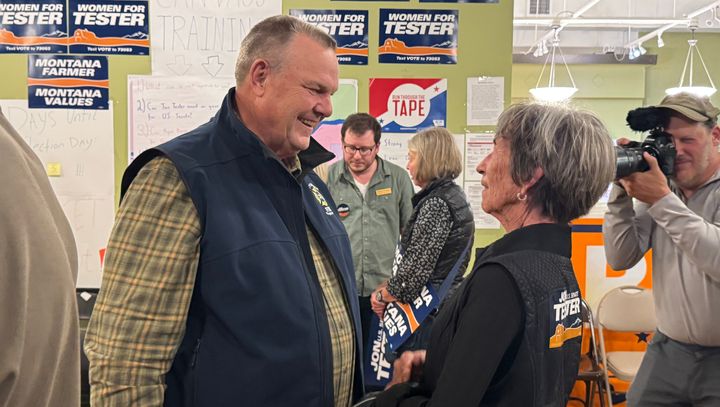GREAT FALLS, Mont. — He defied the odds once, then a second time and a third. Now, Democratic Sen. Jon Tester is hoping to do it again. Now on his fourth try, he’s facing his biggest test yet in a state where, lately, all that seems to matter when election time rolls around is whether you have an “R” next to your name.
As the last statewide-elected Democrat in Montana, Tester is an endangered species. Most of his Democratic friends in the Senate who also hailed from red states have long since been defeated by Republicans or chosen to leave on their own terms (West Virginia’s Sen. Joe Manchin is retiring this year), in yet another sign of the country’s deepening divisions.
Montana has also tilted redder since Tester’s 2018 victory that looked equally insurmountable. The state’s shifting demographics — fueled by an influx of new residents amid the pandemic — Donald Trump’s sky-high popularity, and outsized national attention on the stakes of the race all threaten to spoil the senator’s campaign for a fourth term.

But the “flattopped dirt farmer” from Montana isn’t ready to call it quits, bristling at chatter from political operatives and pundits who believe his luck may have finally run out this year. Clad in his everyman uniform — a flannel shirt, vest and jeans — he turned a question from HuffPost about projections of his seat flipping red into a rallying cry during a campaign stop about an hour drive from his farm on Monday, invoking his inherent Montana-ness.
“The guys in Washington, D.C., they’ve already figured this out. They said, ‘You’re in deep, deep, deep doo-doo,’” Tester told a crowd of a supporters who crammed into his campaign field office in Great Falls, a former Democratic stronghold in northern Montana. “People in Washington, D.C., don’t know jack shit about Montana, and we’re going to show them.”
“We’re in a dead heat,” he insisted, urging volunteers to knock on as many doors as possible and prove the doubters wrong.
‘Things Need To Change’
Public polls of the race have found Tester trailing his GOP opponent Tim Sheehy, a 37-year-old multimillionaire businessman and former Navy SEAL with no prior government experience. Sheehy has called Tester out of touch and assailed his ties to national Democrats, including President Joe Biden and Vice President Kamala Harris, the new Democratic presidential nominee. He’s also blamed him for worsening the situation at the U.S.-Mexico border.
Sheehy has also framed the race as much more than simply about one state. Flipping the seat would most likely hand control of the Senate to the Republican Party next year, giving Trump, if he wins in November, an opportunity to appoint more Supreme Court justices. And if he loses, a GOP Senate could block much of Harris’ agenda, Cabinet choices and potential judicial picks.
“If Trump wins and he doesn’t control the Senate, you can assume he’ll be impeached on Day 1,” Sheehy warned a packed rally of supporters in Missoula, a Democratic stronghold, on Monday.
“The Senate is critical for Trump,” he added. “And if he doesn’t win, the Senate is a firewall for progressive lunacy.”
It is this dynamic that makes Tester’s bid for reelection all the more difficult this time around, nationalizing a race he’d very much like to stick to local issues like protecting public lands, making housing more available and expanding access to health care and abortion — a strategy he successfully employed to defeat his last Republican challenger, now-Rep. Matt Rosendale (R-Mont.).

But Sheehy is no Rosendale, a far-right conservative who was easily caricatured as an out-of-stater from Maryland. He’s proven far more slippery, evading reporters in the state as well as questions about his biography, including his military service and business interests. And although Tester landed many blows against him in their debate on Monday night, the GOP candidate mostly held his own, depriving Democrats of a key moment that might dramatically change the trajectory of the race.
Tester’s campaign believes their path to victory hinges on ticket-splitting voters who support Trump yet also like what the incumbent senator has done while in office, including, most recently, expanding health care for seniors and veterans, two critical voting blocs in the state. Tester’s ads have emphasized his working relationship with Trump when he was president and the senator has steadfastly declined to endorse Harris in the 2024 race.
“It doesn’t matter if you’re Republican or Democrat, it doesn’t matter if you’re [for] Trump, or anti-Trump, if you want somebody that’s going to represent Montana values back in Washington, D.C., I’m your guy,” Tester told HuffPost about his efforts to appeal to Trump supporters.
But Greg Oltvedt, 75, a former Democrat from Lolo, Montana, who has voted for Tester in the past, said he would be casting his ballot for Sheehy this time around.
“He’s had Montana interests, but he’s been a strong supporter of the Biden-Harris regime,” Oltvedt said of Tester as a wide-brim cowboy hat atop his head blocked out the blazing sun.
As he stood and listened to right-wing commentator Charlie Kirk proselytize to students at the University of Montana against liberals, he said, “Things need to change. This country, our republic, is at risk.” He said things changed for him because of Democrats “cheating” in elections, a favorite Trump falsehood on the campaign trail.
‘Rhinestone Cowboy’
Politics in Montana are often about what it means to be a “real” Montanan more than anything else.
Tester, a third-generation farmer, spends an inordinate time reminding voters about being the Senate’s “only working farmer” (sorry, Chuck Grassley, your corn apparently doesn’t count), his flattop haircut and his loss of three fingers in a meat grinding accident, a down-to-earth image that has helped him survive three close elections.
“They don’t look at Jon as a big Democrat in Montana,” Manchin, who left the Democratic Party recently, told HuffPost. “They look at Jon Tester as just Montana. He’s just original. Being original, no one can help him with that.”
Republicans have sought to pierce Tester’s brand, however, mocking him for driving a Prius hybrid in Washington, D.C., and even criticizing his drink of choice during one night out — a vodka cranberry. They’ve also attacked him for voting to impeach Trump and for accepting money from lobbyists despite criticizing the flood of cash into political campaigns in recent years.
Meanwhile, Tester has accused Sheehy, who moved to Montana from Minnesota in 2014 and now owns a private cattle ranch, of being a wannabe cowboy of the type helping fuel the state’s housing crisis. (When Sheehy arrived to debate Tester at the University of Montana on Monday, for example, Democratic volunteers greeted him with chants of “Rhinestone Cowboy.”)
“You got an opportunity to vote for a guy who came to this state a few years back, bought himself a 37,000-acre ranch, blocked everybody off it, and now is charging $12,500 to go hunting on it,” Tester said of Sheehy at their debate on Monday.
The problem: Montana has added a bunch of voters for whom Montanan cred may matter less than conservative politics. In 2021 and 2022, following the coronavirus pandemic, Montana’s population jumped 1.8% and then 1.5% before growth slowed in 2023. All of the population growth was due to people moving into the state, with deaths in state actually outpacing births both years.
Democratic strategists have long feared Montana’s growing population has made the state more conservative, as right-leaning residents of liberal states like Colorado and California move to a state they think better matches their own ideology.
“It remains to be seen if Sheehy being a Halloween cowboy is going to be a problem for him given all the new people who dress up like cowboys every day,” Matt McKenna, a longtime Montana Democratic strategist, told HuffPost.
‘Public Lands Belong To The Public’
One issue where Tester has put Sheehy on his heels is on protecting public lands, a source of pride in a vast state like Montana.
Tester on Monday accused his opponent of making “an incredible transformation” on land use after he called for federal lands to be “turned over” to states or counties (an idea vice presidential nominee JD Vance appeared to agree with), failed to disclose his post on the board of an environmental research nonprofit with a history of advocating for privatizing federal lands and seemed to doctor a recent TV ad to remove the organization’s logo from the shirt he was wearing.
Sheehy, who has spent much of the campaign doing damage control on this issue, claimed he opposes the sale or transfer of federal lands while calling for landowners near national forests in the state to have “more input into what happens on” that land than the federal government.
“Public lands belong to the public, that’s you — the people of Montana,” Sheehy said.
To which Tester responded: “What they say in back rooms, when they don’t think the recorder is going or the camera is running, is usually what they think. And Tim said we need to turn our lands over to either his rich buddies or county government. That’s not protecting public lands.”
‘Tester’s Toughest Race’
The biggest advantage Tester potentially has going for him in this year’s race is a referendum that would codify protections for abortion in the Montana state constitution. The Supreme Court’s 2022 decision that overturned Roe v. Wade, leaving the abortion issue up to the states, has sparked a wave of enthusiasm among Democrats and pro-choice voters across the country seeking to protect reproductive rights, including in Montana, a state with libertarian tendencies.
In 2022, Montana voters rejected a measure that would have declared that an embryo or fetus is a legal person, giving advocates pushing for passage of the constitutional referendum hope it will pass with bipartisan support.
“People would say to me, I’m a lifelong pro-life Republican and I’m against it. I think people realize the problems with an either complete or near complete abortion ban,” Melissa Cunningham, a nurse and Democratic candidate for Montana’s state legislature, told HuffPost of the 2022 measure.

Last year, however, Republican lawmakers passed a bill restricting abortion access, including one saying the state’s right to privacy does not protect abortion rights. Sheehy has also called abortion “terrible” and “murder.” Although he claims to support exceptions to the procedure, such as in cases of rape, incest or when the life of the mother is at risk, he has not ruled out supporting a national ban on abortion.
Tester, like other Democrats, has framed the issue as a matter of protecting individual freedoms, saying that people in Montana “don’t like the federal government telling them how to live their lives.”
Mark Lundquist, an independent voter and U.S. Army veteran who came to see Tester at this campaign office in Great Falls, on Tuesday, said he wanted to see the senator speak more about the issue in order to appeal to women voters. “They’re not so much party-centered as men are party-centered,” he said.
Still, the 75-year-old, who moved to Butte, Montana, from California recently to spend more time with his grandchildren, doubted Tester’s ability to win in a state Trump carried by 16 points in 2020.
“Trump is very popular. This is a Republican state and Tester could lose this, it’s that close,” Lundquist said.
“This is going to be Tester’s toughest race,” he added.
Disclaimer: The copyright of this article belongs to the original author. Reposting this article is solely for the purpose of information dissemination and does not constitute any investment advice. If there is any infringement, please contact us immediately. We will make corrections or deletions as necessary. Thank you.
